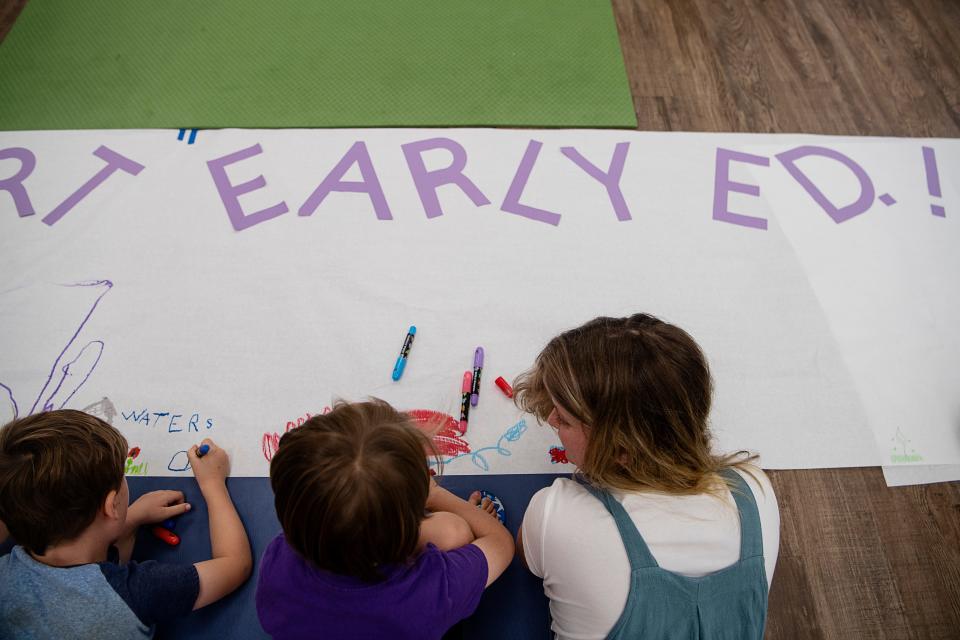NC Health Dept: 7 Western North Carolina child care centers to close, lack of funding

Seven child care centers in Western North Carolina will close on Oct. 31, leaving 300 children without care, according to an Oct. 20 news release from the North Carolina Department of Health and Human Services.
The centers are operated by Southwestern Child Development, a nonprofit that focuses on early care and education. Combined, the seven centers serve nearly 300 children up to 5 years old, the majority of whom receive child care subsidies or N.C. Pre-K services, the release said.
The Buncombe County child care facility is the only center that will stay open. All other WNC childcare facilities run by Southwestern Child Development will be closing, Sheila Hoyle, executive director of Southwestern Child Development Commission told the Citizen Times Oct. 20.
Facilities that are closing, according to NCDHHS spokesperson Kelly Haight Connor.
Murphy Early Education and Preschool in Cherokee County
Hickory Street Early Education and Preschool in Clay County
Elf Early Education and Preschool in Clay County
Clay County Early Education in Clay County
Eagle Knob Early Education and Preschool in Graham County
St Johns Early Education and Preschool in Haywood County
Webster Early Education and Preschool in Jackson County
A recent North Carolina Chamber Foundation survey found that 60% of parents with children who are ages 5 and younger said they had to miss work because of a problem with child care and 32% didn’t pursue job training or continued education because of a lack of affordable child care.
In the meantime, Southwestern Child Development, county departments of social services and NCDHHS are working with Head Start programs and local public schools to ensure children are still receiving quality care and learning, the release said.
"These closures are devastating to children, families and communities who rely on child care to nurture their children’s healthy development and learning, allow parents to work and support their families, and keep local businesses running," Ariel Ford, director of the NCDHHS division of child development and early education said in the release.
The closures come not even a month after the state budget was passed.
Advocates asked the N.C. General Assembly for continuing stabilization grant funding that early childhood programs were given during the COVID-19 pandemic, in the amount of $300 million.
Instead, the state legislature came back with $100 million, extending the grants for another six months. The compensation grants, which were supposed to end in December, will be extended until June of 2024.
This wasn't new funding, but rather money leftover from the pandemic by the American Rescue Plan Act.
More: Without NC funding, child care workers in Asheville, Buncombe could see big pay cuts
"Without access to additional funding, more child care centers could face closure. Unfortunately, the budget passed by the legislature did not include significant new funding for childcare. State health officials join Governor Cooper in urging the General Assembly to make this child care crisis a priority," Ford said in the release.
"There's no additional funding for early childhood education, which is a huge problem," Mayfield told the Citizen Times in September.

Marcia Whitney, president and CEO of Verner Center for Early Learning, told the Citizen Times after the budget passed that the news is deflating for early childhood education.
Verner Center serves more than 200 children in Asheville and Buncombe County. They come from dozens of families, mostly of lower income, who qualify for the federal Early Head Start program.
According to a report by the N.C. Early Childhood Foundation and findings submitted by the Division of Child Development and Early Education, on average a Head Start lead teacher makes $32,986 a year and an assistant teacher makes $20,585 a year.
More: Hillcrest Head Start opens after being forced to close last year: Who can sign up?
An average public school lead teacher for Pre-K makes $43,565 and an assistant teacher makes $21,526. An average child care lead teacher makes $25,372 and an assistant teacher makes $20,269.
The living wage in Buncombe County is $20.10 an hour. The new living wage was announced March 1 by the nonprofit Just Economics of WNC, a huge 14% jump from the 2022 rate of $17.70 an hour. Annually, the $20.10 would come to $41,800.
More: How does newly passed NC state budget impact Asheville, Buncombe schools teachers, staff?
McKenna Leavens is the education reporter for the Asheville Citizen Times, part of the USA Today Network. Email her at mleavens@citizentimes.com or follow her on Twitter @LeavensMcKenna. Please support this type of journalism with a subscription to the Citizen Times.
This article originally appeared on Asheville Citizen Times: Child care centers close down in WNC leaving kids without care

